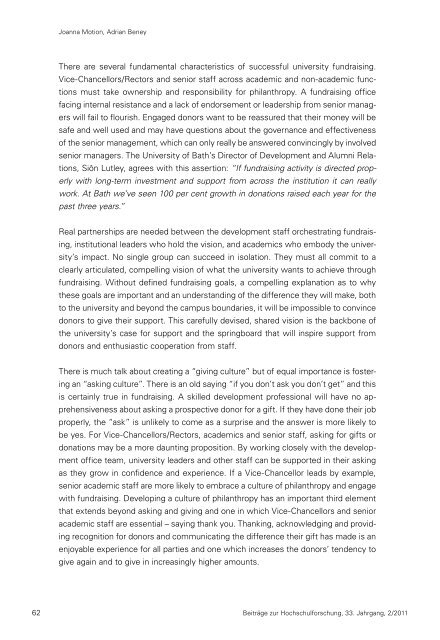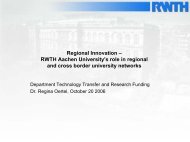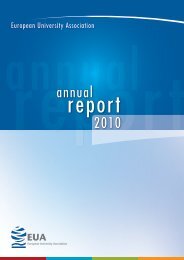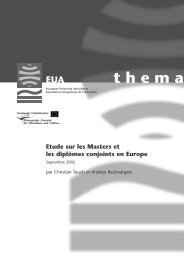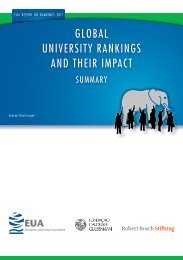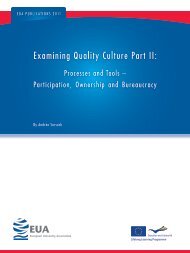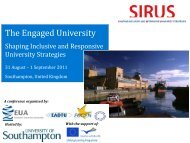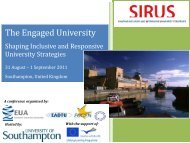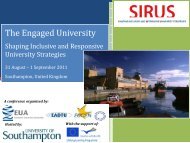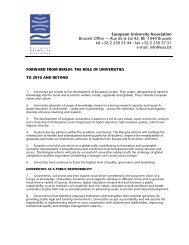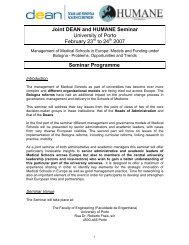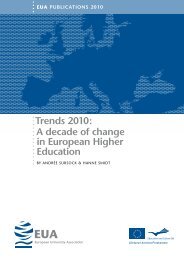Beiträge zur Hochschulforschung - European University Association
Beiträge zur Hochschulforschung - European University Association
Beiträge zur Hochschulforschung - European University Association
You also want an ePaper? Increase the reach of your titles
YUMPU automatically turns print PDFs into web optimized ePapers that Google loves.
62<br />
Joanna Motion, Adrian Beney<br />
There are several fundamental characteristics of successful university fundraising.<br />
Vice-Chancellors/Rectors and senior staff across academic and non-academic func-<br />
tions must take ownership and responsibility for philanthropy. A fundraising office<br />
facing internal resistance and a lack of endorsement or leadership from senior manag-<br />
ers will fail to flourish. Engaged donors want to be reassured that their money will be<br />
safe and well used and may have questions about the governance and effectiveness<br />
of the senior management, which can only really be answered convincingly by involved<br />
senior managers. The <strong>University</strong> of Bath’s Director of Development and Alumni Rela-<br />
tions, Siôn Lutley, agrees with this assertion: “If fundraising activity is directed prop-<br />
erly with long-term investment and support from across the institution it can really<br />
work. At Bath we’ve seen 100 per cent growth in donations raised each year for the<br />
past three years.”<br />
Real partnerships are needed between the development staff orchestrating fundrais-<br />
ing, institutional leaders who hold the vision, and academics who embody the univer-<br />
sity’s impact. No single group can succeed in isolation. They must all commit to a<br />
clearly articulated, compelling vision of what the university wants to achieve through<br />
fundraising. Without defined fundraising goals, a compelling explanation as to why<br />
these goals are important and an understanding of the difference they will make, both<br />
to the university and beyond the campus boundaries, it will be impossible to convince<br />
donors to give their support. This carefully devised, shared vision is the backbone of<br />
the university’s case for support and the springboard that will inspire support from<br />
donors and enthusiastic cooperation from staff.<br />
There is much talk about creating a “giving culture” but of equal importance is foster-<br />
ing an “asking culture”. There is an old saying “if you don’t ask you don’t get” and this<br />
is certainly true in fundraising. A skilled development professional will have no ap-<br />
prehensiveness about asking a prospective donor for a gift. If they have done their job<br />
properly, the “ask” is unlikely to come as a surprise and the answer is more likely to<br />
be yes. For Vice-Chancellors/Rectors, academics and senior staff, asking for gifts or<br />
donations may be a more daunting proposition. By working closely with the develop-<br />
ment office team, university leaders and other staff can be supported in their asking<br />
as they grow in confidence and experience. If a Vice-Chancellor leads by example,<br />
senior academic staff are more likely to embrace a culture of philanthropy and engage<br />
with fundraising. Developing a culture of philanthropy has an important third element<br />
that extends beyond asking and giving and one in which Vice-Chancellors and senior<br />
academic staff are essential – saying thank you. Thanking, acknowledging and provid-<br />
ing recognition for donors and communicating the difference their gift has made is an<br />
enjoyable experience for all parties and one which increases the donors’ tendency to<br />
give again and to give in increasingly higher amounts.<br />
<strong>Beiträge</strong> <strong>zur</strong> <strong>Hochschulforschung</strong>, 33. Jahrgang, 2/2011


